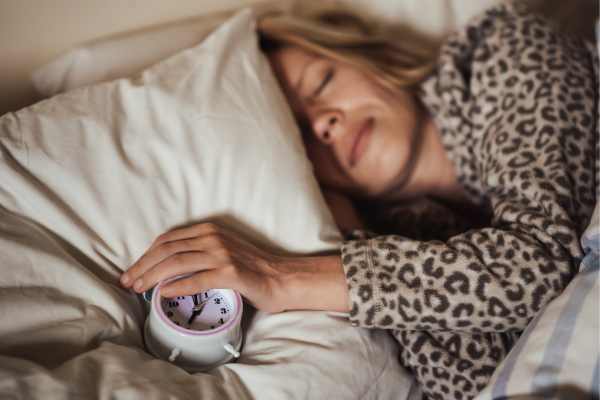Many teenagers and adults alike enjoy sleeping late and in our fast-paced, modern era, it may seem wise to allow your body more time to rest. While some individuals thrive with prolonged sleep, others may be experiencing a disruption to their circadian rhythm, so it’s important to note that individual factors, lifestyle and overall health can influence not only how well we sleep – but how long.
At Essentia, we emphasize the significance of fostering healthy sleep. Acknowledging diverse individual needs, we believe in establishing a rhythm conducive to deep, restorative sleep. Explore the various aspects we recommend for promoting healthy sleep, encompassing a conducive sleep environment and adopting appropriate sleep practices.
Below, we’ve outlined some of the benefits as well as the disadvantages of sleeping late, so you can adjust your habits and make the most of a good night’s sleep.
Pros of Sleeping Late

Quiet and Calm Environment
Going to bed later may allow for a calmer and quieter sleeping environment, so you can enjoy a restful and prolonged sleep without disturbance. Of course, the later you go to bed, the more likely it is that you will sleep late, which may or may not improve your overall sleep quality.
Late Night Productivity
Some people identify as “night owls” – individuals who find that their peak productivity and creativity happens during the late hours of the day. For any self-described night owl, staying up late affords them more time to focus on work or personal projects, in the absence of daytime distractions and demands.
Flexible Schedule
For those individuals in need of greater flexibility in their personal or work schedules, sleeping late allows them to accommodate unconventional work hours, irregular commitments or a late-night social life. Depending on what you do for work, some people find they have no choice but to sleep late in order to keep up with a demanding job. In this case, it’s still important to ensure you are getting your minimum requirement for restful and restorative sleep.
Cons of Sleeping Late

Disrupted Circadian Rhythm
One of the main drawbacks of staying up late is that, over time, it may disrupt your body's natural circadian rhythm. The circadian rhythm regulates our sleep-wake cycles, and irregular sleep patterns can lead to potential sleep disorders. This prolonged disruption to your sleep can contribute to potential long-term health issues.
Social and Work Implications
The truth is that sleeping late is not conducive to conventional 9-5 work hours and social schedules. This can negatively impact job performance, strain personal relationships and lead to an overall decline in well-being. If you find you are always late to work or cannot commit to being on time to a social engagement, you may need to assess your sleeping habits and weigh the pros and cons of sleeping late.
Reduced Exposure to Natural Light
In order for our bodies to absorb vitamin D – a vital nutrient for reducing the risk of heart disease and maintaining bone health – we need exposure to natural light. Sleeping late reduces the window of time your body can be exposed to daylight, which can disrupt your internal clock, leading to mood swings and reduced alertness.
Health Risks
Irregular sleep patterns associated with staying up late – and sleeping late – pose various health risks. These risks include cardiovascular problems, obesity and other chronic health issues. If your sleep quality is compromised, your body's ability to repair and regenerate during sleep is also compromised, posing long-term health concerns.
Impact on Mental Health
Sleep deprivation or irregular sleep can have a profound impact on mental health. Individuals who consistently sleep late may experience increased stress levels, heightened anxiety and a greater susceptibility to mood disorders. Getting regular, restful sleep in the context of a consistent routine is vital for maintaining both our mental and physical well-being.
Less Time for Morning Activities
A lot can be achieved in the early morning and certainly many health-oriented habits are executed before noon, such as eating a balanced breakfast, working out and maintaining your personal hygiene – showering, washing your face, brushing your teeth. These habits are often best performed in the morning for optimal results, and sleeping late may mean you sacrifice a balanced self-care routine. It’s difficult to maintain any kind of morning routine if you consistently go to bed very late.
A healthy sleep routine is important for overall well-being.
Going to bed late is often associated with unhealthy habits and poor sleep. Recent studies suggest that enhancing both the quantity and quality of sleep has a more substantial impact on overall health than either diet or exercise alone. To grasp the significance of sleep, it is crucial to recognize the importance of cultivating healthy sleep habits for overall well-being.
Many individuals still fail to link their sleep patterns with their general health and wellness. Understanding the distinct stages of the sleep cycle, such as the REM and Non-REM phases, is essential for gauging the quality of your sleep – whether it's restful or inadequate.
Examining the advantages and drawbacks of sleeping late underscores the necessity of striking a healthy balance between lifestyle choices and adopting habits that promote well-being. While night owls may thrive during late hours, some may discover that their nocturnal activities disrupt their daytime responsibilities. Maintaining awareness of how late-night sleep impacts personal and professional life is crucial for establishing a sustainable sleep routine that enhances overall health.
How to find your rhythm and have a healthy sleep pattern
While sleep habits and individual sleep needs may vary, there are nonetheless a certain number of elements that it may be relevant to follow to ensure healthy sleep.
Ensure a designated sleep hour
Maintaining a consistent sleep schedule is crucial for overall well-being and cognitive function. To achieve this, establishing a designated sleep hour and sticking to it diligently is essential. Consistent bedtime and wake-up times regulate the body's internal clock, promoting better sleep quality. This routine not only improves the quantity but also enhances the quality of sleep. Adequate and quality sleep is vital for optimal physical and mental health, leading to improved mood, enhanced cognitive performance, and a strengthened immune system. Prioritizing a designated sleep hour helps individuals foster a healthy sleep routine, positively impacting their daily life and overall well-being.
Invest in a Quality and Organic Mattress
Choose a comfortable mattress to facilitate falling asleep at the desired time. Having the perfect environment for your body to enjoy luxurious, comfortable, deep and restorative sleep is necessary to learn how to have a healthy sleep rhythm. Essentia's certified organic mattresses create the perfect sleep environment for you to experience unmatched REM and Deep Sleep to benefit from all the amazing outcomes quality sleep provides including mental and physical recovery.


